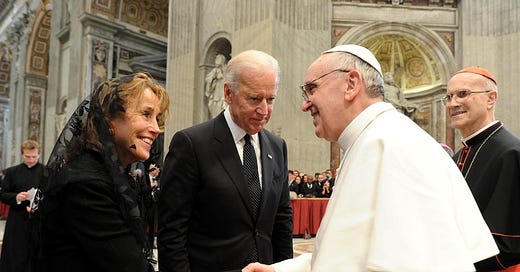What the Pope Can Teach Biden—and the World
On the critical need for leaders and citizens to think beyond themselves to help solve international problems

President Biden is slated to meet with Pope Francis at the Vatican this Friday ahead of the G20 and COP26 international summits. Although an agenda has not been announced, the two leaders are expected to talk about a range of pressing global issues from war and conflicts to climate change and refugees to poverty and public health.
Unfortunately, the upcoming meeting between the two leaders is being covered in the press mainly through the lens of domestic politics and divisions over which Catholic teachings should dominate both U.S. politics and the future of the Church itself.
These debates rarely change and seldom get resolved: What is more central to Catholic teaching—social issues like abortion, contraception, and same sex marriage or economic issues like poverty, migration, and the ability to support one’s family? Which party agenda is closer to these most pressing issues? Should bishops deny communion to pro-choice Catholic political leaders like Biden, or should bishops stay out of politics and stick to the spiritual needs of parishioners? Is Pope Francis a “leftist Jesuit” who should be challenged within the Church, or a humanitarian voice for justice and peace who should be heeded over right-wing forces seeking to limit the focus of Catholicism to a few areas?
Using a wider lens, this religion-as-politics approach is a misguided way to view the relationship between Catholicism and secular society, not only for American Catholics but for international leaders preparing for critical discussions on the global economy, migration, the pandemic, and global warming.
The goal should not be to align domestic political forces with religious teachings in selective ways designed to advance ideological agendas. Rather the goal should be to learn from various religious principles and teachings—Catholic and others, along with secular philosophical ideals—to gain wisdom and insight about how to better order and manage collective life across national boundaries.
You don’t need to be Catholic or even religious to see the importance of Pope Francis’s vision for stewardship, social harmony, and solidarity in the battles against global poverty, inequality, disease, and planetary decline. If every nation and political party around the world fights solely for its own interests, as important as those are in national contexts, who or what is fighting for action on challenges that cross national borders and affect all people? No one really.
I’m no priest but when people ask me what it means to be a Catholic, the one thing I always come back to is that growing up Catholic teaches you to look beyond yourself and your own problems. No one is better than anyone else at a human level and everyone deserves equal treatment and respect. This is the origin of the famous “Catholic guilt” that afflicts many believers—not an actual objective of the Church but a vital by-product of teachings that require people to put matters of conscience to real world tests.
This vision of looking beyond yourself has both personal and political repercussions.
On the personal level, this means be kind to others. Don’t be judgmental. Give people a chance and offer forgiveness. Try to put yourself in other people’s shoes. Don’t ever get on the high horse. Help those who need it, whether they ask for it or not. The basic ethical glue that holds up strong families, good friendships, cordial relations between people, and charity and assistance for the most vulnerable.
On the political level, looking beyond yourself and seeing everyone as inherently equal and worthy of respect means nations must take care of their own people and work together to solve common problems while helping those countries which may not have as much in terms of resources or money.
“I’ve got mine Jack now buzz off,” is not in the Catholic handbook and shouldn’t be in the global one either.
Given the pessimism about the state of the world today expressed by citizens in many countries—plus rising challenges to global cooperation and peace from extremist movements and other fundamentalists—the world desperately needs a smart moral discussion about the values and beliefs that can best serve humanity rather than individual nations and distinct groups of people alone.
This discussion is what Pope Francis and President Biden can start on Friday, and hopefully bring to the rest of world in upcoming summits.
We all could use more contemplation about a vision that no one is any better than anyone else, that everyone deserves equal dignity and rights, and that no nation can just look out for itself. These are foundational religious and philosophical principles worth discussing among world leaders and then applying to the concrete global challenges ahead of us.
Although we are all different and live in distinct national contexts, we rise and fall together as one human race on one planet.




